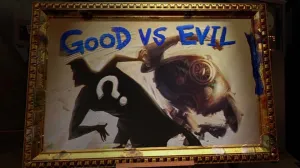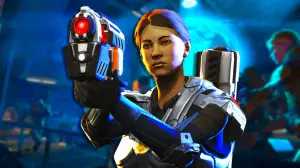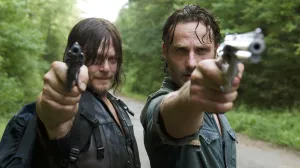The Epic Tales of Captain Underpants makes its official debut on Netflix today, providing kids and kids at heart with a new animated series to enjoy.
Videos by ComicBook.com
The Dreamworks Animation project serves as a sort of continuation to Dav Pilkey’s Captain Underpants books, as well as last year’s Captain Underpants: The First Epic Movie. The first season follows George Beard (Ramone Hamilton) and Harold Hutchins (Jay Gragnani), two fourth graders who can transform their grumpy principal, Mr. Krupp (Nat Faxon) into the superhero Captain Underpants.
The Epic Tales of Captain Underpants is equal parts off-the-walls zany and surprisingly heartfelt, thanks in part to executive producer Peter Hastings. Hastings, whose filmography includes Animaniacs, Pinky and the Brain, and Teenage Mutant Ninja Turtles, brought a pretty unique approach to the series, and he recently sat down with ComicBook.com to talk all about it.

ComicBook.com: How did you get brought on to this project? Did you have any experience with the Captain Underpants world?
Peter Hastings: I’m familiar with Captain Underpants from many years ago, when I looked at books with my son, and it just always had a fondness for … and then it’s finally ended up at Dreamworks, and I have worked with many people here, so they specifically asked me if I wanted to come and work on it which I just jumped at the chance because Captain Underpants is just so much fun. It’s so well-loved.
How did it feel expanding on the source material of the books and the movie and all of the other mediums that this story has been in? How did it feel taking that into a new direction?
I was very considerate of the original book material when it came to making the show, but everything that I’ve done with the show is really based on either something that’s in the books, or the spirit of the books. And so, certainly Dav Pilkey has always had this fondness for telling stories in an interesting way, in a different way. In turning the medium inside-out, and really expressing his creativity with the characters themselves. And then just with the way that he tells the story. So that was what I really land with when it came to expanding it. So it’s this new part, but coming out of the original spirit of the books.
Did any of your previous work help inspire the series in any way? I’ve definitely gotten a Animaniacs sort of vibe from some of the energy of this show.
I mean, I think there’s a kind of storytelling and a kind of humor and stuff like that that I just really like. And so, if I’m able to work it into the show, then I’m on. That’s great. I think the Animaniacs had a lot of freedom, and this show also has a lot of freedom in terms of how we tell stories, what we do, breaking fourth wall, just … doing alternate kinds of animation, doing all this sort of stuff. So, that spirit is … I don’t know. It’s present in me, so it’s gonna happen in the shows that I work on.
The series switches back and forth from styles of animation quite a bit, from standard animation to puppets to flip books. What was the reasoning behind that stylistic choice?
I’ve always wanted the show to be really handmade, and so the two things I always think about and tell the crew to do is, “What would George and Harold make if they were doing it?” Because they are creative people who like to make things. What would they want to see? They might make something that’s a little more on the janky side, some puppets or some paper cutouts, stuff like that, and what they’d like to see is something really cool like a giant robot and that kind of thing.
But pretty much, the idea of things being handmade and hand-crafted, the open window to do all these kind of things, again comes from some of the flip-o-ramas that are in the book. You flip back and forth between two pages and it creates a simple animation. And it was just like a departure from regular storytelling, so it was about expanding that in a different medium. We’re dealing with motion and animation and that kind of stuff, [so we’re thinking about] what are the versions of that, that we can do. And the whole spirit of the show is very much, I think, about creative expression. And so, that was our invitation to go crazy at this party.

Is there a particular moment or episode from the season that you’re really proud of? Something that kind of stands out at you, like, “I can’t believe we were able to do that?”
I think probably the biggest surprising success for me are the comic book sections that are in the show. There are comic books in the books themselves that George and Harold make, and so I didn’t really know how it was going to work out. And I just wrote this multiple-paragraph comic book and ended up just reading it to scratch vocal track, and it ended up being what we used for all those comics, creating a comic narrator. And the drawings for that are just so fantastic. That was really, surprisingly a great part of the show that I’m really happy to have.
The cast of Captain Underpants has quite an array of talent, from Sean Astin and Nat Faxon to David Koechner and Lorraine Newman. Are there any actors that are on your wishlist, who you would love to bring on in a future season?
That’s a good question, I don’t know if I have a good answer to that. There’s so many great actors with great voices. I find sometimes, you can be a little self-involved and just say, “I really want to meet this person, so let’s cast them in this role.” And I tend to not do that so much. I don’t have a specific person for that.
I do know that Captain Underpants is very fun in the sense that you mention it to people who you think wouldn’t know about it, and their faces just light up. So that happens with actors, too.

Captain Underpants definitely has a nerdy, comic book sort of sensibility to it. Are there any existing comics that you would want to adapt? What sort of comic books are you passionate about?
I generally, when I’m working on something that’s highly comedic, the next thing that I like to do is something that’s actually more tough and cool. So my answer is that I don’t know, but I’m totally open.
What do you hope that viewers will take away from this series? The fans of the books will obviously take away one thing, but what do you hope people who aren’t necessarily familiar with this franchise will get out of it?
I mean, I’d like it to be the kind of show where if a parent is walking through the room or sitting down with their kid, that they also enjoy the show and are surprised by it. But I think ultimately what is important to me is all the devices and techniques, and the kind of story-telling we’re doing, to me are a little bit of a lesson in creative thinking. And while they’re not direct lessons, I think when kids see this thing that there are other ways to do things, that there are alternative ways to tell something, and ultimately you’re developing their sense of humor at the same time. To me, that’s the ultimately takeaway for a kid.
But mainly, I want the people who like the books to feel like we’re succeeding in delivering that feeling and flavor, and I would love for it to be a multi-generational experience as well.
—
The first season of The Epic Tales of Captain Underpants is now available on Netflix.








